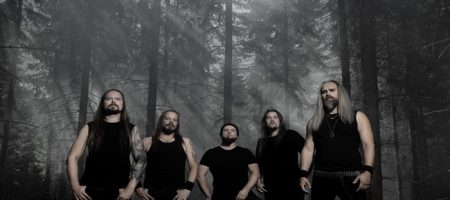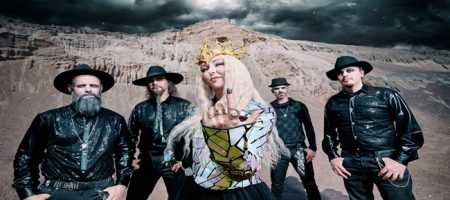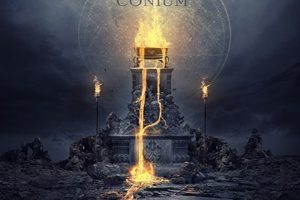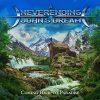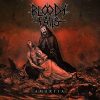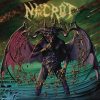Epica – A Cyclic World
Sunday, 7th February 2021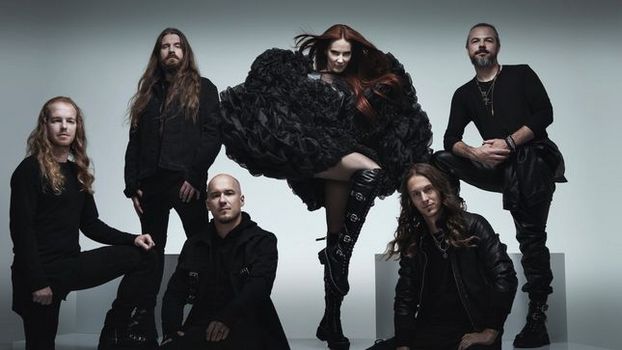
One of the leading acts when it comes to symphonic metal, Epica have made a name for themselves built around bombastic and vibrant dyamics, intelligent songwriting and lyrics, as well as an appeal that goes beyond the genre. They’ve been raising a bar for themselves with each new album, and Omega continues this trend for the act. Though there’s a true sense of balance within the tracks this time – despite a 70-minute runtime there’s no down time or fillers. An incredibly strong album from beginning to end, and one we got the chance to discuss with guitarist/vocalist Mark Jansen about in detail, as well as balancing family/band dynamics, what’s he’s learned as a professional musician, and much more.
Dead Rhetoric: What stands out to you about Omega?
Mark Jansen: The mix first of all. On The Holographic Principle, it was a bit too full – especially if you wanted to listen to the album from beginning to end. All of the instruments are in your face and it could be a bit too much at some points, so for Omega we wanted to have the guitars priority sometimes, occasionally give the orchestra priority, and create more dynamics like that. The second thing is that we wanted to have a few more songs that would do really well in festival settings. When people see you for the first time, some songs do better than others, and a song like “Beyond the Matrix” does really well in that setting. So we wanted to have a couple of songs that would do really well in festivals.
Dead Rhetoric: Omega is touted as the last of the metaphysical trilogy of albums for the band. How do you feel the concepts tie back into your previous two albums?
Jansen: Since The Quantum Enigma, we have had a strong connection with science and scientific topics. Quantum Enigma, in short, was dealing with the act of observing changes and the outcomes. When you observe something, you influence its behavior. You can even change its qualities. The Holographic Principle was more dealing with this concept that we might be living in a hologram. We explored the idea, even if it sounded a bit far-fetched. But I think it is possible that we are living in a sort of simulation.
Now the Omega album is dealing with the Omega Point theory – a theory that we are fated to one point of unification. It could be that it’s true, if we start a big bang at one point and then the universe started expanding it could be that in the end, we swirl back towards one point. It’s like a circle, and everything in the universe is circles anyways – orbits of planets, changes of seasons, life and death – everything is in circles.
Dead Rhetoric: You kind of hit on this off the bat in discussing The Holographic Principle, but more is more seems to be an issue for many bands, particularly symphonic metal bands. How do you feel that Epica sidesteps some of the issues with having to try to make something that feels more epic than your last album?
Jansen: Yeah, a lot of times it is more and more until you realize that you reach your limits. Maybe we even went a little over the limit this time. But that’s only when I listen to the album [The Holographic Principle] from beginning to end, when I notice there’s a little too much for the ears to process. So we thought it would be cool to take a step back and get the dynamics back into the music. Every time, you have to try. It’s a bit of trial and error, and then you try to polish it until you find your perfect way. Of course, the search for perfection is neverending, because you always take something and learn from it. I think on Omega, we now have a mix that satisfies me a lot. This is definitely a road we will continue on for the next album past this one.
Dead Rhetoric: The book, The Essence of Epica, came out between albums. Did looking back through your time as a band influence the writing process at all?
Jansen: As a band, you go through different phases. You try things, and some things work and some don’t. So it’s always a matter of finding the balance again. Most of all, it’s important to keep communicating with each other. That’s something we really learned along the way with Epica. When you have an issue with someone, talk about it right away and solve the situation. That’s the secret for a band to exist for a long time. I analyzed myself too, to see what goes wrong with bands. When a band has one leader, who tells everyone what to do – you see there are a lot of people coming and going because they don’t feel satisfied. This one person tells them what to do. On the other side, you have bands that are perfect democracies who don’t get anything done because they keep discussing things forever.
I thought maybe it’s best to have something in between. Even though I started the band, we are kind of a democracy. Only when I really don’t like something I say that I don’t want it, or how I want the band to evolve. But that hardly ever happens. That’s why everyone is very happy in the band nowadays. We talk about things, and everyone feels respected and important. Everyone is important. So that’s the secret for a band to have a long life span.
Dead Rhetoric: You made a third “Kingdom of Heaven” track in “The Antediluvian Universe.” Could you discuss the personal side of this series of tracks?
Jansen: The Kingdom of Heaven trilogy is very personal to me. The first “Kingdom of Heaven” was dedicated to my grandmother, the mother of my father. She was very dear to me, and even like a mother to me, because I spent 50% of my childhood with her. When she passed away, it was very sad. To dedicate my favorite Epica song of all time at least made it something beautiful. Whenever I think of “Kingdom of Heaven” I think about my grandmother and it’s always in a very positive way because of that.
With the newest part, I wrote it together with Isaac [Delahaye] and my grandmother from my mother’s side and his grandmother passed away in the same week. So for me, it was a no brainer that this song had to be dedicated to both of our grandmothers. Now this this, I feel at peace. It’s never nice to lose a person in your life that is important to you, but at least when you can dedicate a beautiful song it at least makes you feel at ease with the situation.
Dead Rhetoric: So between how the band functions and dedicating songs and showing a more personal side to the tracks, is family a big piece – not just with you as individuals but within the band as well?
Jansen: Definitely – when we started as a band, it was always going full force. Sometimes the home situations would suffer because of that since we were so focused on only doing things for the band. Nowadays, it’s more in balance. Some of the members have kids, and Isaac’s wife is pregnant. So there’s one more kid coming. You need to find a way to have the home situation in balance with the band. You can’t go full force forever with the band or there would be serious consequences on the homefront because of it. That’s not what we want. I think that now we realize how important family is. Also, the older you get, you start seeing those things and putting them in the right perspective. I am happy that we found a nice balance.
Dead Rhetoric: How important is the relationship between Joost van den Broek and the band? Do you consider him an additional member at this point?
Jansen: Yes, especially during the recording period and just before it, like when we are finalizing songs. He’s like a band member. His vote counts as much as a band member, so he has equal options as the rest of us. It’s like we have seven people in the band when we are working on the album – the six of us plus him. Together we make all of the decisions about what is good and bad for the album. I trust him 100%. He’s one of those guys that is a genius – he’s a great producer and mixer, and also a great songwriter. We are happy to work with him, and consider him a seventh band member when we work on an album.
Dead Rhetoric: Does having the same artist do your covers for multiple albums at this point [Heilemania] aid in giving the band a sense of consistency?
Jansen: In the beginning, you don’t know who to work with, so you kind of go around, but then we found Stefan Heilemann and since we have worked with him – even though we are very happy with the old covers as well – there’s such a connection. It’s like what we have with Joost with the music. We say one word and he understands what we want. He creates something, and sometimes it’s something we haven’t even imagined ourselves – he really brings something extra to the table and only a few people can do that. So it’s a very good relationship that we have with him, and a very fruitful relationship as well.
Dead Rhetoric: You’ve done a lot of acoustic tracks with the new Epica releases, as well as the Design Your Universe re-release. Do you feel that a good song should shine, regardless of how it’s presented?
Jansen: If you have a good song, you can do multiple versions of it and it remains a good song. You see that with many old hits from the past, like from the ’70s and ‘80s. They were great hits, and there was multiple versions. Every person gives a unique touch to these songs, and it’s nice to play around with these tracks. For the new album, we did four. For each one, we wanted to do something completely different with it. A different atmosphere and style, but still keeping the essence of the song intact. Instead of simply making a translation to album track to acoustic, we wanted to do something extra with it.
Dead Rhetoric: It’s not like you stick to the ‘soft songs’ either, which is what I like. You completely change it around and give it an entirely different vibe.
Jansen: We always say that to make the soft songs into acoustic versions is easy. They are already almost acoustic. But to turn a heavy song into an acoustic one is a challenge. We always like challenges [laughs].
Dead Rhetoric: You are doing this cool Adopt a Wolf campaign. I noticed that the goals are related to streaming numbers – how important are streams to a band like Epica at this point?
Jansen: That’s more of a management decision. They have a lot of knowledge with that, and how the algorithms work. If you have a lot of streams for your videos, that when your album comes out, you are higher in the ranks and things like that. If you have better streaming numbers, your album will have a better release visibility. I didn’t know all of those things, so they explained it to me. That’s really their cup of tea, and they have been working on that. If it makes a great release for us, then it’s perfect.
With the wolves part, I was a little skeptical to connect it to release numbers to be honest. You can easily say that we are using them to achieve the stream numbers. So I was a bit cautious about it, but as long as the wolves get help, then even if it can be interpreted in a bad way, the wolves still get help. So for me, that’s a positive thing. In the end, it is important that whenever we have the chance to help animals in need that we take that opportunity. We have done some campaigns with the Worldwide Federation of Nature in the past, and I have done a few personally. I always support these things, even if it’s a small amount. All of those little pieces of support make a big difference in the end.
Dead Rhetoric: Epica has made a lot of headway in the US with the past few albums. Are you concerned that this COVID-related touring downtime is going to have a negative affect when you can finally get back on the road again? Many European bands view the US in that you have to get over here regularly in order to start generating a fanbase.
Jansen: There’s some truth to that, but I think that once you have been over to the US 6 or 7 times, you don’t have to worry about that anymore. If you just go once and then not again for 10 years, people forget about that first time easily. But I am not afraid that the US fans will forget about us due to the COVID problems. I am a bit concerned about the visa prices though, which have risen a lot for foreign bands to come to the US. It’s a bit of a pain in the ass. It’s already very annoying to get the visa stuff together, but to make it extremely expensive too, it makes it very unmotivating to come to the US.
It’s like they are trying to make it impossible for foreign bands to come to the US. It’s so extremely expensive. The only reason for us to come back to the US is the fans. I really love the US fans, but I hope that the visa stuff stops being out of control. It’s not only the price, but that you have to fill in the online form that takes forever. Then you have to go an embassy, and so I lose like two days because I have to fly to one. It’s really a huge effort before you can even get to the US. If you have to pay a huge amount of money for that, at a certain point it’s like – c’mon, it has to be worth it or you can’t keep doing it anymore.
Dead Rhetoric: I don’t want to sidetrack too far, but hopefully with a new administration in place now, maybe there will be some changes for the better in that regard? We will see I guess.
Jansen: Yeah, I really hope so. But I think it’s regardless of administration. These raises have been happening over time, without depending on the Republican or Democratic Party. It keeps going up over the years steadily. In the past, it was cheap, but now it’s getting very expensive.
Dead Rhetoric: What insights do you feel that you have gained in being a professional musician?
Jansen: You learn many things along the way. Especially with people. You learn to listen to people and to put yourself into the other person’s shoes to see their perspective. Everyone has a unique perspective and you learn the most about dealing with someone that way. In the music world, there are so many issues and problems, but many of them are not so big and are easily solvable, as long as you are willing to solve the problems. That’s what I have learned over the years. Many problems that you think are huge when you are young, are in fact little ripples in a lake. They are easily solvable when you listen well to each other. I think that’s a good lesson for many bands starting out. Don’t make it too hard for yourselves or the people around you. Just go with the flow a bit, learn like a sponge, and take the opportunities.
Dead Rhetoric: What’s in store for Epica in 2021? Any updates from MaYan or United Metal Minds?
Jansen: With Epica, we have a lot of shows planned. For the upcoming summer, there are a lot of festivals planned. But to be honest, I don’t know if they will happen. But it’s out of our control, so we can only sit and wait to see what happens. Hopefully things happen in the right direction, but with new mutations, you never know. With MaYan, we live very far away from each other and we sit together to write songs, so at this point, it’s impossible. So hopefully, over the year travel restrictions will become less strict.
With United Metal Minds, we have all of the songs written, we just need to work on vocal lines. We also need to make sure everyone can reach the studio once it is booked. At this point, that’s not a reliable thing – to book a studio due to the situation changing daily due to COVID. So we are waiting for a more stable part of the year when things calm down and then we can record the album.











